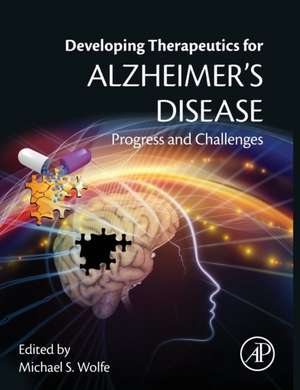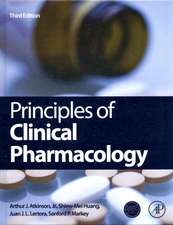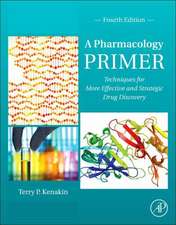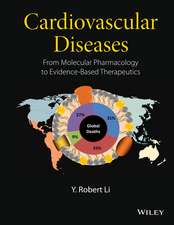Developing Therapeutics for Alzheimer's Disease: Progress and Challenges
Editat de Michael S. Wolfeen Limba Engleză Hardback – 15 iun 2016
Written by international leaders in the field, the book assesses prospects for the emergence of effective agents and allows readers to better understand the challenges, failures, and future potential for research in Alzheimer’s disease. This book is a valuable resource to academic scientists carrying out translational research in Alzheimer’s disease, industrial scientists engaged in Alzheimer's drug discovery, executives in biopharmaceutical companies making strategic decisions regarding the direction of internal research and potential outside partnerships, and graduate-level students pursuing courses on Alzheimer's therapeutics.
- Provides a realistic but promising assessment of the potential of various therapeutic approaches to Alzheimer’s disease
- Focuses primarily on neuroprotective agents and cognitive enhancers, as well as approaches to targeting the amyloid B-peptide, tau and Apolipoprotein E
- Discusses alternative approaches, preclinical and clinical development issues, related biomarkers and diagnostics, and prevention and nonpharmacological approaches
Preț: 858.15 lei
Preț vechi: 1138.14 lei
-25% Nou
Puncte Express: 1287
Preț estimativ în valută:
164.26€ • 178.48$ • 138.07£
164.26€ • 178.48$ • 138.07£
Carte tipărită la comandă
Livrare economică 14-28 aprilie
Preluare comenzi: 021 569.72.76
Specificații
ISBN-13: 9780128021736
ISBN-10: 012802173X
Pagini: 676
Dimensiuni: 191 x 235 x 28 mm
Greutate: 1.54 kg
Editura: ELSEVIER SCIENCE
ISBN-10: 012802173X
Pagini: 676
Dimensiuni: 191 x 235 x 28 mm
Greutate: 1.54 kg
Editura: ELSEVIER SCIENCE
Public țintă
Academic and industry research scientists developing therapeutics for Alzheimer's Disease; pharmaceutical executives; venture capitalists; funding and resource allocation strategists; graduate students in pharmacology, neuroscience and other biomedical fieldsCuprins
1. The Complex Pathways to Mechanism-Based Therapeutics in Alzheimer’s Disease
2. The Genetic Basis of Alzheimer's Disease
3. B-Secretase Inhibition
4. Y-Secretase Inhibitors: from Chemical Probes to Drug Development
5. Therapeutic Targeting of AB42
6. Modulators of Amyloid B-Protein (AB) Self-Assembly
7. Anti-Amyloid-B Immunotherapy for Alzheimer’s Disease
8. Targeting AB Receptors to Modify Alzheimer’s Disease Progression
9. Blood-Brain Barrier Transport of Alzheimer’s Amyloid B-Peptide
10. Alzheimer’s Disease Therapeutics Targeting Apolipoprotein E
11. Microtubule Stabilization
12. Tau Phosphorylation as a Therapeutic Target in Alzheimer's Disease
13. Stimulation of Tau Degradation
14. Passive Immunotherapy for Tau Pathology
15. Inhibition of Tau Aggregation as a Basis for Treatment and Prevention of Alzheimer’s Disease
16. Neuroprotective Strategies for Alzheimer’s Disease Prevention and Therapy
17. Symptomatic Cognitive Enhancing Agents
18. Tackling Alzheimer's Disease by Targeting Oxidative Stress and Mitochondria
19. Preclinical and Clinical Issues in Alzheimer Drug Development
20. Molecular Imaging in Alzheimer Clinical Trials
21. Fluid Biomarkers and Diagnostics
22. Non-Pharmacologic Activity Interventions to Prevent Alzheimer’s Disease
23. Prospects and Challenges for Alzheimer Therapeutics
2. The Genetic Basis of Alzheimer's Disease
3. B-Secretase Inhibition
4. Y-Secretase Inhibitors: from Chemical Probes to Drug Development
5. Therapeutic Targeting of AB42
6. Modulators of Amyloid B-Protein (AB) Self-Assembly
7. Anti-Amyloid-B Immunotherapy for Alzheimer’s Disease
8. Targeting AB Receptors to Modify Alzheimer’s Disease Progression
9. Blood-Brain Barrier Transport of Alzheimer’s Amyloid B-Peptide
10. Alzheimer’s Disease Therapeutics Targeting Apolipoprotein E
11. Microtubule Stabilization
12. Tau Phosphorylation as a Therapeutic Target in Alzheimer's Disease
13. Stimulation of Tau Degradation
14. Passive Immunotherapy for Tau Pathology
15. Inhibition of Tau Aggregation as a Basis for Treatment and Prevention of Alzheimer’s Disease
16. Neuroprotective Strategies for Alzheimer’s Disease Prevention and Therapy
17. Symptomatic Cognitive Enhancing Agents
18. Tackling Alzheimer's Disease by Targeting Oxidative Stress and Mitochondria
19. Preclinical and Clinical Issues in Alzheimer Drug Development
20. Molecular Imaging in Alzheimer Clinical Trials
21. Fluid Biomarkers and Diagnostics
22. Non-Pharmacologic Activity Interventions to Prevent Alzheimer’s Disease
23. Prospects and Challenges for Alzheimer Therapeutics









